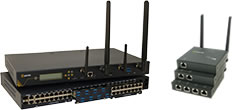
Data center design can support business needs
By Donna DonnawitzMay 16, 2012
Companies are increasingly recognizing that the core design of their data center systems can allow them to better match their technological setup with their operational needs. According to a recent Data Center Knowledge report, this trend is manifesting itself in how businesses choose every aspect of their facility, including the core setup that dictates how they will implement server, network, cooling, power and HVAC systems.
The news source explained that slab, raised floor and modular data center setups are all becoming popular options for organizations, with companies increasingly choosing which solution will work based on how it will support business requirements.
In the case of slab data centers, the primary slab upon which equipment is placed is supported by hot and cold aisle containment. This allows all of the heated exhaust air to be filtered into just a few aisles while the air going into servers is kept cool. The report said that slab configurations generally are used where the power infrastructure is housed above server racks and the HVAC systems are centralized. This setup is ideal for businesses that need flexibility in the data center, allowing them to more easily move servers around and adjust the infrastructure.
Raised floor setups are more static in nature, the report said, and are best suited to businesses that are primarily running mainframe-like servers. In the raised floor setup, servers sit on top of a paneled floor raised off of the primary ground level. Cabling, power and cooling infrastructure typically resides under the floor panels. The news source explained such setups are mandatory in areas with frequent earthquakes, as it provides necessary stability for the data center systems.
Modular data centers are fairly new, but are emerging as the ideal solution for companies with limited facility space or who are building their infrastructure in unique geographical settings, according to Data Center Knowledge. At its core, modular data center design puts servers, network equipment and everything else into a shipping container, allowing companies to simply plug it in to get their facility up and running.
As companies consider aligning data center infrastructure to operational needs, they also have to consider how they will manage diverse facility setups. In many cases, console server systems are ideal because they allow for remote data center management, allowing IT to take care of multiple facilities from a single central location.
Perle’s wide range of 1 to 48 port Perle Console Servers provide data center managers and network administrators with secure remote management of any device with a serial console port. Plus, they are the only truly fault tolerant Console Servers on the market with the advanced security functionality needed to easily perform secure remote data center management and out-of-band management of IT assets from anywhere in the world.



